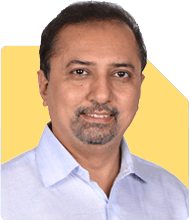Archana Deshpande |95 Answers |Ask -Follow
Image Coach, Soft Skills Trainer - Answered on Apr 25, 2024
She has been working with individuals and corporate organisations for more than 10 years during which she has helped professionals and students improve their soft skills, build confidence and enhance self-esteem.
An engineer from the PDA College of Engineering, Gulbarga, Archana had a successful career at Reliance Communications. But she has always been interested in teaching and training people. So she pursued a postgraduate diploma in teacher’s training at Pune’s Symbiosis Institute of Management Studies followed by teaching assignments in schools at Visakhapatnam and Mumbai.
Archana also holds an international certificate in image consulting and soft skills training from the Image Consulting Business Institute, Mumbai.... more

Hello sir, im a married business women running my own store but after i become a mother ,my business is going in loss. Is it im not will balancing between motherhood and business. Please give me some advice.
You are a married business woman and now you are a mother too!! Congratulations!!
There was a time in the world when a woman was revered just because she was a mother, she carried humanity forward, that in itself was a big responsibility. It is time to put the mother back on the pedestal.....in India they say giving birth, is like a 'punarjanam', rebirth for a woman. Don't you deserve some rest at least for 40 days before you start thinking of your business and all. Your body has undergone a lot during pregnancy and birth of your child. Rest a little, heal well and then get back to work. You deserve it!!
Now the action plan for you to perform the dual responsibility of a mother and a business woman with grace ..
Your baby totally needs you for the first 6 months because you need to breast feed her. Gradually get her used to other care givers. Build a good support system at home as well as at your store. Earmark an area at the store and at your home which can work as home/office. Don't feel guilty about carrying your baby to the office, remember how the New Zealand ex-PM Jacinda Ardern, carried her new born to the parliament?
It is a balancing act between the two... motherhood and business woman, it'll take time and you'll eventually learn it. Give yourself sometime, don't beat yourself down if there is a little loss now in your business or blame motherhood for the loss. With a new born your schedules will go haywire for sometime. Soon you and your baby will settle down into a routine, you'll have to work for that. Be very flexible, flow like a river for sometime, with your mental peace as the centre.
Don't try to do everything by yourself, delegate, seek help.
List out what is important for you in life. Have every task laid out on paper, plan and schedule activities, this one act will bring in a lot of peace to you. You'll never ever feel overwhelmed. Prioritize all tasks on a scale of 1 to 5. Keep your targets simple and doable on a day to day basis.
In between being a mother and a business woman, take care of yourself too!! Sleep well, eat well, 20 mins of physical activity and doing one thing that brings you joy( it can be as small as looking at the sun set or sipping your chai peacefully) on a daily basis will give you the strength to perform your balancing act.
Loads of blessings and best wishes!!
You may like to see similar questions and answers below
Chandu Nair |65 Answers |Ask -Follow
VC, Angel Investing, Entrepreneurship Expert - Answered on Jun 15, 2023
Nayagam P P |4079 Answers |Ask -Follow
Career Counsellor - Answered on Jul 31, 2024
Prof Suvasish Mukhopadhyay |340 Answers |Ask -Follow
Career Counsellor - Answered on Jan 30, 2025
Prof Suvasish Mukhopadhyay |340 Answers |Ask -Follow
Career Counsellor - Answered on Jan 30, 2025
Prof Suvasish Mukhopadhyay |340 Answers |Ask -Follow
Career Counsellor - Answered on Jan 30, 2025
Shalini Singh |144 Answers |Ask -Follow
Dating Coach - Answered on Jan 30, 2025
Prof Suvasish Mukhopadhyay |340 Answers |Ask -Follow
Career Counsellor - Answered on Jan 30, 2025
Prof Suvasish Mukhopadhyay |340 Answers |Ask -Follow
Career Counsellor - Answered on Jan 30, 2025
Shalini Singh |144 Answers |Ask -Follow
Dating Coach - Answered on Jan 30, 2025
Prof Suvasish Mukhopadhyay |340 Answers |Ask -Follow
Career Counsellor - Answered on Jan 30, 2025
Prof Suvasish Mukhopadhyay |340 Answers |Ask -Follow
Career Counsellor - Answered on Jan 30, 2025
Ravi Mittal |516 Answers |Ask -Follow
Dating, Relationships Expert - Answered on Jan 30, 2025
























